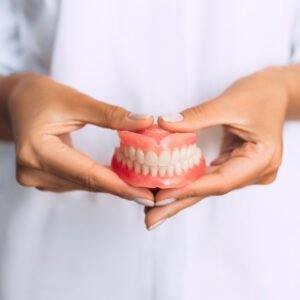
There are many reasons why a patient may require dentures. Complete or partial dentures are made of long-lasting materials and are designed to look like your own natural teeth. Aesthetics, reconstruction after trauma, and proper bite function are all common reasons why someone might need dentures, but one thing is common between all patients who own them—keeping your dentures clean is very important! Improper dental care and cleaning can lead to numerous problems with the actual prosthetic, not to mention potential health problems associated with the buildup of bacteria. Here’s some basic information as well as a few denture care instructions.
What Are Dentures?
Dentures are a type of removable prosthetic teeth used to replace those that have been lost to decay or through trauma. Dentures are usually made of a synthetic, resinous material that are even harder than your natural teeth. Dentures can either be “Complete” or “Partial.”
Complete dentures rest on the gums and soft palate and completely replace the top or bottom sets of teeth. Complete dentures are more common in older patients. Partial dentures are usually used to replace a few teeth and are more commonly used as part of a reconstructive dentistry regimen after trauma. The prosthesis attaches to titanium screw implanted into the jaw for a strong and reliable bite—as well as a natural appearance.
How To Clean Dentures
Cleaning your dentures is recommended to both extend the lifetime of your appliance and prevent any instances of bad breath or infection due to an accumulation of dental plaque. Plaque is a hard, sticky substance that forms on structures in the mouth and is an ideal place for bacteria to accumulate if it is not removed.
While plaque may dull or yellow the look of your dentures, the real danger is to the areas where the dentures contact the soft tissues in your mouth, as these are prone to infection. To clean your dentures:
- Place your dentures on a rolled-up towel near your bathroom sink or where you plan to clean your dentures. The towel will provide some cushioning should you accidentally drop your dentures.
- Used a soft bristled brush to gently clean every surface of your dentures, taking care to clean the indentations and grooves around the prosthetic teeth especially. Do not use toothpaste for this part, as many kinds of toothpaste are too abrasive for dental prosthetics. Use a mild soap and warm water if you prefer.
- Rinse your dentures with warm water, but don’t let them sit in hot water. The temperature may warp the shape of your dentures.
- Specially made ultrasonic cleaning machines can remove plaque and bacteria automatically without any effort on your part.
It’s recommended that you brush your dentures twice a day, once in the morning and once at night. You can also rinse off your dentures after every light meal or snack throughout the day to minimize the accumulation of buildup.
Expanded Denture Care Instructions
Besides daily cleanings, there are a few other things you can do to extend the life of your dentures and keep your oral health in check. With proper care and the occasional extended maintenance, dentures can last for the better part of a decade. To ensure they get to this point:
- Don’t let them dry out, as this can make your dentures hard and brittle. Soak them in a dental soaking solution or at least a glass of water overnight or if you remove them for an extended period.
- Don’t use bleach or similar products to whiten your dentures. These chemicals can have adverse effects on the plastic materials and cause them to warp, crack, or otherwise deform.
- If your dentures break, do not attempt to repair them with household or industrial glue. Instead, notify your dentist immediately and bring in all the pieces of your dentures to your next appointment. Your dentist may elect to have the dentures repaired, or to replace them entirely.
Dentures are a reliable and safe replacement for missing teeth and allow most patients to live their lives normally without dietary restrictions or a compromised smile. With proper care and knowledge of what’s best for your appliance, your dentures will serve you for years to come.

